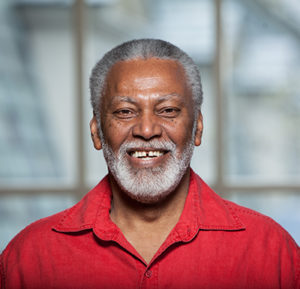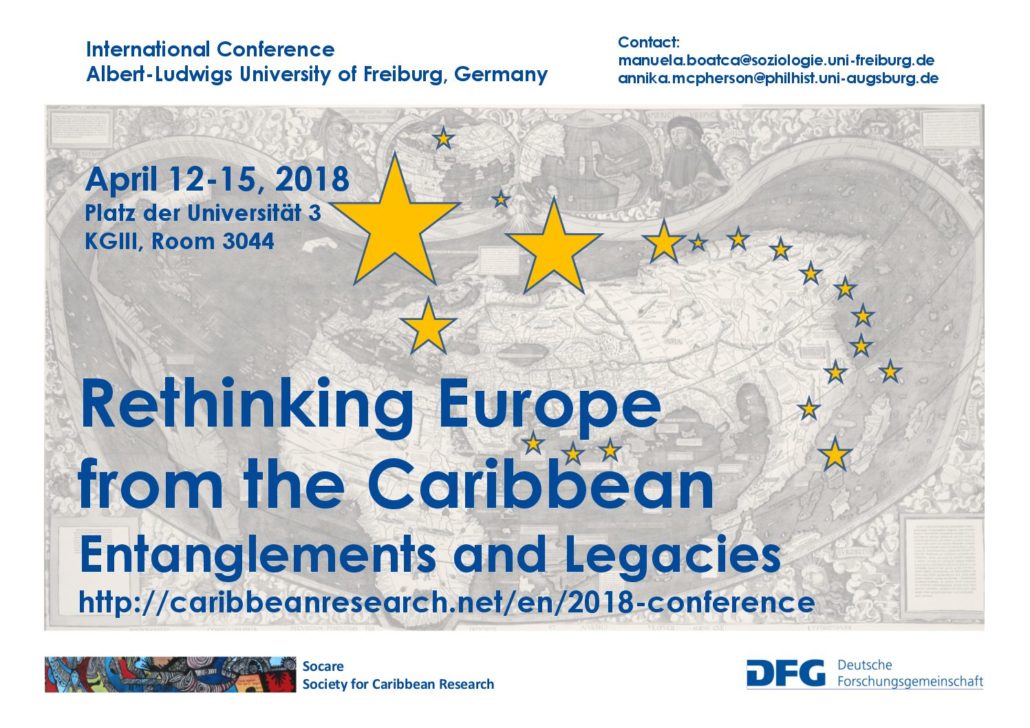Willkommen / Welcome
“Rethinking Europe from the Caribbean: Entanglements and Legacies”
When: April 12-15, 2018
Where: Albert-Ludwigs-University of Freiburg, Germany
The multiple ties that bind the Caribbean and Europe are the main focus of the conference marking 30 years since the Society for Caribbean Research (Socare) was founded. The 2018 conference at the University of Freiburg focuses on the legacies and continuities of European colonialism in the Caribbean and on transregional entanglements between the Caribbean and Europe. Examining languages, (post)colonial histories, socioeconomic trajectories, and aesthetic practices in the Caribbean in their relations to Europe also provides a basis for rethinking Europe from the Caribbean. The conference thus aims to challenge the hypervisibility of Western Europe by highlighting Caribbean entanglements with othered and racialized Southern and Eastern Europes, as well as through the frequently ‘forgotten Europes’ still claimed as overseas territories and regions in the Greater Caribbean, and asks what Caribbean perspectives can contribute to a different and more nuanced understanding of Europe(s) today.
Programm / Program
You may find the program / Das Programm finden Sie here / hier
Keynote “The Political Culture of Caribbean Sovereignty” by Linden F. Lewis (Bucknell University)
 “Linden Lewis is the Associate Dean of Social Sciences, and Presidential Professor of Sociology. He is the editor of The Culture of Gender and Sexuality in the Caribbean, and the co-editor of Color, Hair and Bone: Race in the Twenty-first Century, and has recently edited the anthology Caribbean Sovereignty, Development and Democracy in an Age of Globalization. He has also recently co-edited special issues of The Canadian Journal of Latin American and Caribbean Studies, and The Caribbean Review of Gender Studies. He has taught at Bucknell since 1991, and was the Chair of the Sociology Department from 2007-2010. His areas of specialization are race, culture, gender, particularly Caribbean masculinity, political sovereignty, labor and state relations. He has lectured extensively throughout the Caribbean, Europe, the U.S. A. and Africa. […] Linden has been an active teacher scholar whose work addresses issues related to race and gender. He is the editor or author of five books and has published numerous articles as well as refereeing scholarly work in his discipline. His course offerings have dealt with issues of race, gender, and globalization in the Afro-Caribbean and African-American context. As a recognized scholar in his field, he served as President of the Caribbean Studies Association (2009-2010).” (Exzerpt from Linden Lewis’ university profile. Picture with friendly permission by Linden Lewis. The full description and further information is available here)
“Linden Lewis is the Associate Dean of Social Sciences, and Presidential Professor of Sociology. He is the editor of The Culture of Gender and Sexuality in the Caribbean, and the co-editor of Color, Hair and Bone: Race in the Twenty-first Century, and has recently edited the anthology Caribbean Sovereignty, Development and Democracy in an Age of Globalization. He has also recently co-edited special issues of The Canadian Journal of Latin American and Caribbean Studies, and The Caribbean Review of Gender Studies. He has taught at Bucknell since 1991, and was the Chair of the Sociology Department from 2007-2010. His areas of specialization are race, culture, gender, particularly Caribbean masculinity, political sovereignty, labor and state relations. He has lectured extensively throughout the Caribbean, Europe, the U.S. A. and Africa. […] Linden has been an active teacher scholar whose work addresses issues related to race and gender. He is the editor or author of five books and has published numerous articles as well as refereeing scholarly work in his discipline. His course offerings have dealt with issues of race, gender, and globalization in the Afro-Caribbean and African-American context. As a recognized scholar in his field, he served as President of the Caribbean Studies Association (2009-2010).” (Exzerpt from Linden Lewis’ university profile. Picture with friendly permission by Linden Lewis. The full description and further information is available here)
Film Screening of Últimos días en La Habana (2016), dir. Fernando Pérez
But day to day life of Havanna is not stoping at Diegos bedside or is diturbed by Miguel trying to get the visa. Perez shows modern day Cuba and its problems of making a living beside the goals of the revolution by presenting a rather harsh picture of reality.
A reality that is given a new turn by the arrival of Diegos niece Yusi in the life of the two friends. The fearless teenage girl is pregnant and by representing the family of Diego, is full of hope, that problems can be solved the cuban way! In the person of Yusi Fernando Perez is centering on the positiv side of cuban life, that keeps the island aflot and shows a way to the future with at least some sort of hope.
Fernando Perez was born in Havanna 1944 and is today one of Cuba`s most renowned directors. After he studied literature he began as assisting director in the cuban film industry. His own films like “La vida es silbar”1998 or “Suite Habanna”2003 won multiple international awards. “Ultimas dias en la Habana” was shown at the Berlinale 2017.
With
Jorge Martinez, Patricio Wood, Gabriela Ramos….
Produced by ICAIC Havanna, Cuba and Wanda Vision, Spain
Distribution in Germany: Kairos Film
(Text: Jörg Wenzel)

